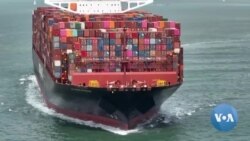A plan to make supply chains in the Indo-Pacific region more secure.
Welcome to VOA Asia Weekly. I'm Chris Casquejo in Washington. That story is coming up, but first, making headlines:
The South Korean military released pictures of a salvage operation Wednesday to recover what is believed to be parts of North Korea's space launch vehicle in the ocean. The North attempted but failed to launch its first military spy satellite. Seoul officials said air raid siren warnings were sent in error but defended their approach as “better safe than sorry.”
South Korean President Yoon Suk Yeol hosted the country's first summit with leaders of Pacific islands on Monday. Concerns over China's security ambitions for the strategic waters and economic leverage among the small island countries have led to increased engagement in the region from the U.S. and its allies.
Faced with record heat and a shortage of power in Vietnam’s capital city, Hanoi authorities turned off some streetlights to save electricity as demand for air conditioning soars, shrouding some neighborhoods in darkness.
U.S. Secretary of Defense Lloyd Austin met with U.S. military personnel at Yokota Air Base in Japan on Wednesday, before meeting with Japan’s defense chief, Hamada Yasukazu, in Tokyo.
Taiwan’s representative to the U.S. says Washington and Taipei have made key progress on resolving the backlog of U.S. weapons deliveries to Taiwan – estimated as worth some $19 billion – and they are working closely to provide additional training for Taiwanese defense forces. Civilians begin serving a year of mandatory military service – rather than four months – in 2024.
A year after U.S. President Joe Biden first launched what's known as the Indo-Pacific Economic Framework – or IPEF – negotiations have yielded what Washington is calling a landmark supply chain coordination agreement.
Created a year ago by the White House, the Indo-Pacific Economic Framework was set up to enhance business opportunities for the 14 Pacific Rim countries that have signed up so far.
Last week, representatives met in the U.S. and came away with what they are calling a plan to make supply chains in the region more secure.
U.S. Commerce Secretary Gina Raimondo announced the plan that includes forming a crisis response network to give early warnings about supply chain disruptions, along with a council to coordinate supply chain activities.
Marc Mealy with the U.S.-ASEAN Business Council gave this example of how that would work.
“A government, let's say, will agree, we won't slap a ban on the export of rubber gloves in response to a future health pandemic. We'll agree to make sure that we coordinate if we are going to have some restrictions on how air travel can occur.”
China is not part of IPEF, but its top trade representatives took part in the Asia-Pacific Economic Cooperation talks in Detroit. China’s Commerce Minister Wang Wentao met with Commerce Secretary Raimondo, then met U.S. Trade Representative Katherine Tai on the sidelines of APEC.
“As the two largest economies in the world, how we relate to each other has implications. Not only for our economies, our workers, our businesses, our middle classes, but for the entire world we know.”
For business owners like Ben Zhang, whose Seattle company supplies corporations with promotional marketing products, other countries in the region still can’t compete with China’s manufacturing capabilities.
“It takes forever to fulfill a project. China is like, okay, you get a project. Boom boom boom. They get done.”
U.S.-China tensions are forcing businesses like Zhang’s to employ a China-plus strategy and find alternatives to sourcing products in China. But COVID restrictions prevented him from traveling overseas to make new connections and that makes it hard to move to producers that aren’t China based.
“Everything we've done has been based on Zoom and in a video conference. But that's different from a handshake, have a meal, break a piece of bread, you know, really learn a little bit deeper about their philosophies, values, operating values. So it's pretty hard. In terms of reliability, we basically, you know, take a gamble.”
That’s part of the reason why decoupling from China is not an option for many businesses. But the hope is that IPEF might make that gamble less risky.
A Chinese spaceship with three astronauts onboard blasted off Tuesday morning for the country’s Tiangong space station.
They’ll replace a crew that’s been on the orbiting station for six months.
China built its own space station after it was excluded from the International Space Station, largely due to U.S. objections over the Chinese space program’s close ties to the Chinese military.
Visit voanews.com for the most up-to-date stories.
Thanks for watching VOA Asia Weekly. I’m Chris Casquejo. Until next week.
Look at this rare all-white giant panda that was caught on surveillance cameras in China’s Sichuan province recently, according to state television CCTV. Researchers said the panda was estimated to be five or six years old. The white panda is believed to be an albino and could be the only one of its kind in the world.











